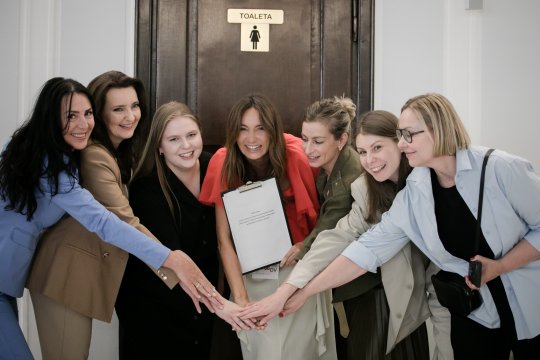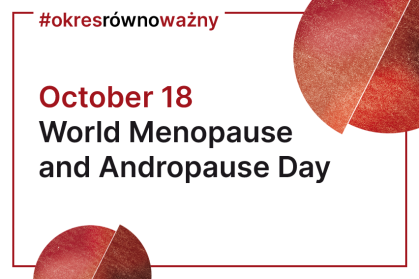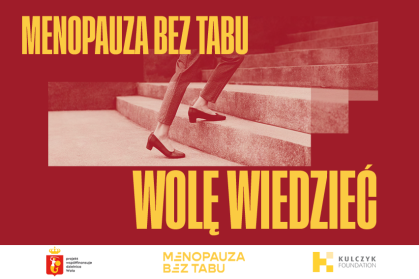Period Poverty Bill Already in the Sejm

“Two years ago, we set a goal of preparing legislative changes that would turn the situation of women around. On 8 March, we visited the Polish Parliament and presented the premises of the bill. And today, we reached our destination. We are handing the bill over to female Members of the Sejm and the Senate. This proves how strong and impactful we are!” said Dominika Kulczyk, President of the Kulczyk Foundation, with visible satisfaction. It was on her initiative that the Periodic Coalition was formed to bring organisations and individuals together against period poverty.
The draft bill obligates competent Ministers to introduce regulations on the availability of menstrual products in educational facilities. According to the explanatory statement to the bill, ensuring their availability, both physically and financially, shall be the obligation of the state that stems directly from women’s right to healthcare.
The authors of the bill point out that the state’s failure to fulfil this obligation may lead to the stigmatisation of women and underestimation of conditions related to menstruation. As an example, they cite endometriosis. For women who struggle with the condition, the lack of understanding in their community and the stigma that accompanies menstruation further obstruct their diagnosis and treatment.
A two-year struggle for dignity
The explanatory notes to the bill include a broad overview of the many aspects of period poverty. And a reference to the need for ensuring equal opportunities for men and women on the labour market. However, at the core of the bill lies the belief, clearly expressed in the content of the document, that the lack of unrestrained access to menstrual hygiene products and the resulting deficits in women’s access to education and limitations on their ability to exercise their labour rights, “undermines the principle of human dignity that constitutes the foundation of an individual’s status in a democratic state.” This is the key issue emphasised by Dominika Kulczyk.
“These were two years of advocacy for – I cannot stress this enough – the dignity of women. You can talk at lengths about dignity, you can make grand gestures to show your respect for women but this cannot be a substitute for the most important thing: a change in thinking about equal opportunities for women and men. And such equal opportunities – at school and at work – can only be achieved by understanding gender differences. And by preventing these differences from becoming barriers,” emphasised Dominika Kulczyk.
Individual and systemic action
During a conference held in the Sejm in connection to the presentation of the bill to Polish MPs, representatives of the Periodic Coalition highlighted the organisation’s achievements. These include donation, in collaboration with Coalition partners, of 13 million of menstrual products to those in need and the creation of an online education hub providing materials on menstruation for use by parents, teachers, employers, officials and journalists. The Periodic Coalition has conducted a number of public awareness campaigns aimed at drawing people’s attention to period poverty. The Coalition also managed to bring the topic of menstruation into mainstream media: more and more online portals, TV stations and newspapers bring up the subject of period poverty, fighting taboos and disseminating reliable information.
“These are important initiatives indeed, but they are all individual activities. Today, we are finalising our work on a systemic solution that involves amendment of legislation so that the access to menstrual products and menstrual education at Polish schools is guaranteed by law,” emphasised Dominika Kulczyk, referring to the importance of the bill. The President of the Kulczyk Foundation added that other countries have similar legal solutions in place.
“We want to follow the example of England, France, Scotland or New Zealand, where such regulations and programmes already exist,” she explained.
Consider the bill as soon as possible
Magdalena Schejbal of the Pink Box Foundation, also associated with the Periodic Coalition, has no doubt that legal changes are necessary to reach young people on a broad scale with reliable knowledge about menstruation.
“If the bill is passed, it will be easier to break the taboo that perpetuates harmful myths about menstruation. We are already doing all this but grassroots initiatives have a smaller reach than systemic solutions. That is why we are happy that the bill has made it to the Sejm,” said the popular Polish actress and activist.
Paulina Wasiluk from Akcja Menstruacja [Menstruation Action] Foundation, another partner of the Periodic Coalition, agrees:
“Our experience shows that there is a great need for knowledge about menstruation in schools, in the youth community, and there are still many people whose access to menstrual products is restrained for a variety of reasons. This is exactly why I am hoping that our bill is considered by the Parliament as soon as possible,” said Paulina Wasiluk.
From declaration to practice
While in the Sejm, representatives of the Periodic Coalition stocked the parliamentary bathroom with menstrual products. Research commissioned by the Kulczyk Foundation showed that two-thirds of women in Poland were at least once in a situation where they did not have access to menstrual pads or tampons at school. Any woman can find herself in such a situation, also in the workplace – such as the Sejm.
Upon presentation of the bill to Members of the Parliament, Dominika Kulczyk took the occasion to thank deputies from various parliamentary clubs who were involved in preparing the new legislation. She encouraged their colleagues to support the bill regardless of their political affiliations. The Periodic Coalition collected nearly 50,000 signatures online under its petition to adopt legislation to ensure access to menstrual products in schools and to provide menstrual education. According to a survey commissioned by the Kulczyk Foundation, the new legislation is supported by 64 percent of Poles.
“Now is a high time to transform declarations into practice and make lasting changes that will improve the situation of millions of girls and women in Poland. Let’s do this together!” urged Dominika Kulczyk.
Fot. Simona Supino




